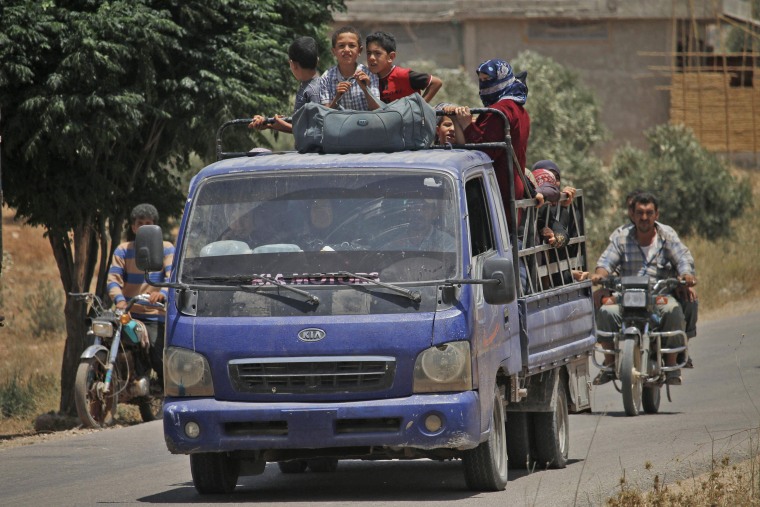Fadi Masalmeh is having to make decisions a nurse should never have to make.
As southern Syria is battered by air strikes, the latest front in a devastating civil war, his hospital is overwhelmed.
"We cannot help the wounded and we have to choose whose life we can save and who we can't," Masalmeh told NBC News via voice message on Friday. "I saw people dying in front of me and I couldn't do anything for them."
The United Nations estimates at least 46 civilians have been killed and many more injured since June 17 when the government launched sustained artillery and aerial shelling in the rebel-held areas of the Deraa province.
At least 160,000 people have been displaced, the U.N. said.
Syrian government forces backed by Russian air power launched attacks on the rebel-held southwest last month after defeating the last remaining insurgent pockets near the cities of Damascus and Homs.
President Bashar al-Assad is aiming to restore control over a strategically vital part of the country at the borders with Jordan and the Israeli-occupied Golan Heights, building on his military's momentum elsewhere in the seven-year conflict.
Assad is pressing the offensive despite warnings from the United States, which has been seeking to uphold a "de-escalation" deal it brokered with Moscow in the southwest last year.
Washington had warned Assad of serious repercussions, but there has been no sign of action to stop him.
Kremlin spokesman Dmitry Peskov said Friday that Russian President Vladimir Putin and President Donald Trump will have a detailed discussion about the war-torn country when they meet in July.
'GHOST CITY'
Masalmeh's wife and four children are among thousands who have fled towards the Jordanian border due to the escalating conflict. He's stayed behind, continuing to work at the hospital near the center of the conflict.
"Everyone is running for his life," Masalmeh said.
"There is no life here in Deraa. The once beautiful place turned to a ghost city," he said.
Jordan, which already hosts more than 650,000 registered Syrian refugees, has said it will not open the border for more.
The country has been facilitating talks between rebel factions and Moscow over a deal that would end the violence in exchange for the return of state rule in the region surrounding Deraa.
Russia has supported army advances with airstrikes since entering the war in 2015 and has played a role in mediating surrender deals.

Motaz Alhashesh, who lives in Tal Shihab north of Deraa city, told NBC News that the continuous shelling across the region has been the most violent he's seen since the war broke out seven years ago.
"The warplanes are bombing 24 hours, non-stop," the 30-year-old said. "I believe that the regime will continue with the military operation until we all get killed or (have) been displaced."
Alhashesh, who works for a local humanitarian organization, said it feels as though the international community has given up on the region and the government is taking advantage by pushing ahead with a "brutal military operation against the people."
"Leaving is probably the only solution to stay alive and to save our families," he said.
A spokeswoman for the U.N.'s humanitarian affairs office said the majority of civilians fleeing the region have headed towards the Jordanian border and many have been stranded in a desert area with little access to humanitarian aid.
Five attacks were also reported on healthcare facilities, including hospitals, between June 24 and 27, the U.N. said. Homes and civil infrastructure have been destroyed in several towns throughout the province.
Supplies have been delivered to the newly displaced people and cross-border conveys from Jordan remain open, but the U.N. said two planned convoys were postponed this week due to safety concerns.
The World Food Programme said the fighting has disrupted convoys getting through to the region, with the last delivery being made on Wednesday.
Dina El-Kassaby, regional communications officer for the WFP, told NBC News that despite the setback, food rations have reached 45,000 people and supplies are being gathered in anticipation of increasing need.
"We are prepared to assist anyone and everyone who is in desperate need, but the numbers are continuing to grow," she said. "Many of these people who have been displaced have already been displaced several times, and they're hitting rock bottom."
While the WFP is prioritizing nutritional needs, especially of children, El-Kassaby said other U.N. partners are focused on providing shelter to those displaced.
"People are telling us that they are sheltering in the open air, under trees or in crowded makeshift shelters, and those lucky enough to find tent are sharing with four or five other families," she said.
Israel Defense Forces said in a statement Friday it had distributed supplies including 300 tents, food, medicine and clothing to people who had fled to the Golan Heights area near the Israeli border.
Those displaced are described by the Israelis as "living under poor conditions" and "often lacking access to water, electricity, sources of food or other basic necessities."
But crossing into Israel is not an option. Israeli forces are not permitting Syrians to enter the country, although it remains committed to distribute more aid as needed.
Israel has refused to accept refugees fleeing the conflict in Syria, a country with which it remains officially in a state of war. Israel also accuses Iran of stationing military bases and personnel in Syria to use as a launch pad for attacks into Israel.


